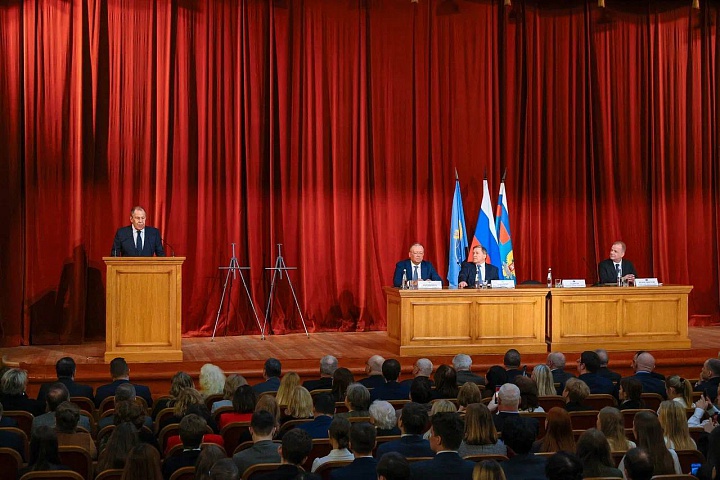Foreign Minister Sergey Lavrov’s address at a ceremony to mark the 90th anniversary of the Diplomatic Academy of the Foreign Ministry of Russia, Moscow, March 14, 2024
Mr Yakovenko,
Mr Ushakov,
Mr Panov,
Colleagues,
First of all, I would like to extend my personal greetings to the management, professors, the faculty and students of the Diplomatic Academy of the Foreign Ministry of Russia on its anniversary.
The history of the Academy is inseparably connected to the illustrious chronicle of the Foreign Ministry of Russia. Established in a difficult pre-war period to strengthen the personnel of the People’s Commissariat of Foreign Affairs, the Diplomatic Academy has trained several generations of graduates who have upheld the interests of Russia on the international stage with distinction. Its graduates include legendary diplomat Anatoly Dobrynin and outstanding modern statesmen such as Speaker of the Federation Council of the Federal Assembly of Russia Valentina Matviyenko and Presidential Aide Yury Ushakov, who is attending this event. I am delighted to welcome all of you.
The Academy worked commendably during the difficult periods of change and has adapted to modern realities, gaining the prestige of a leading academic and educational centre in the field of international relations. It offers broad opportunities for receiving an excellent education and learning several foreign languages thanks to the teaching staff who wisely combine their years of diplomatic experience with fundamental theory. Our special thanks go to the Academy’s veterans – outstanding academics and diplomats who contributed to the school’s unique academic and educational potential.
The Diplomatic Academy, just like the ministry’s other university, MGIMO, is a pool of talents for Smolenskaya Square. We appreciate the high standards of its graduates, who do not waste time to become an integral part of the tightly-knit ministry staff and work hard in the interests of our country in the ministry’s head office and foreign missions.
Academy graduates also apply their knowledge in other spheres like government service, the corporate sector, multilateral organisations, journalism and science.
In light of the ongoing development of a multipolar world order, international relations are becoming more complicated and unpredictable, as President Vladimir Putin said in detail in his addresses, including his interview with Dmitry Kiselev on March 13, 2024.
Russian diplomats should continue learning and improving their skills throughout their career. They are assigned very different tasks ranging from global economy and cultural and humanitarian ties to digital diplomacy, artificial intelligence, arms control, climate change and other issues which traditional diplomacy did not deal with before. Traditional diplomacy only dealt with issues of war and peace. Globalisation, even though it is now taking the form of regionalisation, has increased the interdependence of everything and everyone on this planet. There are no longer any borders between different disciplines, spheres of human life and regions. When countries “sort out” their relationship, they should use instruments that reflect professional knowledge and their connection to global events.
I would like to express special gratitude to the Academy’s professors and faculty for their contribution to the advanced training of the ministry’s staff. It is a separate and very important sphere of the Academy’s activities.
The Academy’s Higher Diplomatic Courses, where senior diplomatic workers for Russia’s foreign missions are trained, remain as popular as ever.
We highly appreciate the Academy’s contribution to analytical support for the Foreign Ministry’s performance, as well as the involvement of young people, including from the Council of Young Scientists and the Scientific Student Society, in preparing expert materials. We are grateful to the Academy’s veterans, rector Alexander Yakovenko and vice-rectors for their contribution to this work, for promoting their own research projects and for helping young scientists.
The Diplomatic Academy is keeping up the tradition of training foreign students and offering advanced training to diplomats from post-Soviet countries and many states of the Global South, that is, Asian, African, Middle Eastern and Latin American states. This helps strengthen interstate relations and debunk the anti-Russia myths, which are being promoted increasingly actively by our ill-wishers.
I am sure that the Diplomatic Academy will continue to keep pace with the times, introduce modern training methods and contribute to our common efforts to implement the foreign policy set out by the President of Russia and aimed at strengthening our country’s positions in the world. For our part, we will continue to provide all-round assistance and support to the Academy.
In conclusion, I would like to emphasise that our foreign policy is not opportunistic but is strategic and looks to the future, which President Putin has clearly and unambiguously reaffirmed in his interview with the Rossiya television channel on March 13, 2024. Our policy is rooted in the fundamental national interests of our country and all peoples of Russia rather than on election cycles as in many “democratic” Western countries. The most important thing is that the policy of President Putin enjoys overwhelming support from the majority of our citizens. There is no doubt that they will reaffirm their support at the presidential election, which will begin on March 15, 2024.




